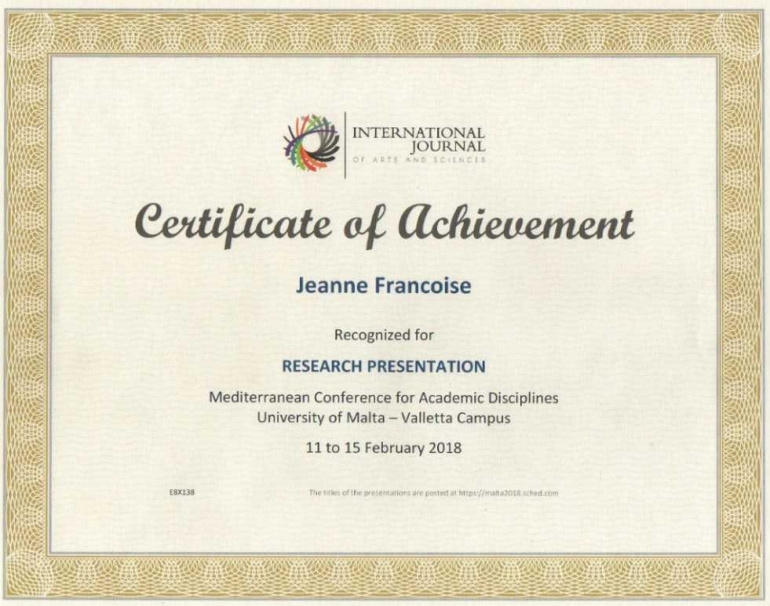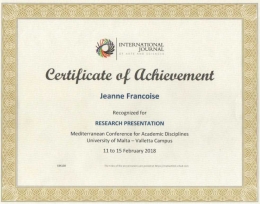This is not Full Paper. Full Paper was published by IJAS Conference.
Annual Multidisciplinary Conference in University of Malta, February 11-15, 2018
"Defense Heritage Protection in Indonesia"
Jeanne Francoise, I Wayan Midhio, Triyoga Budi Prasetyo
(Email: monicajeannefrancoise@gmail.com ; Indonesia Defense University)
Abstract:
This paper, that would be presented in Annual Multidisciplinary Conference in University of Malta, February 11-15, 2018, would speak about the lesson learned of defense heritage protection around the world, and what government of Indonesia is doing to preserve and co-exist the materials or defense heritage sites around Indonesia.
To preserve, manage, and nominate some sites to be noted in UNESCO's World Heritage is not an easy process, because UNESCO has its own priority and programme to check and investigate all sites around the world, that are merit to have UNESCO's World Heritage logo. Regarding to this issue, somehow Indonesia is applying World Heritage Convention and send some sites to be nominated in UNESCO World Heritage Committee, as well as maintain the tourism business aspect of that sites.
To analyze the problem and the needs, this paper is using the theory of Modernity by Alain Tourraine and theory of historiography of mentality (Histoire de la mentalit) by March Bloch. The theory of Modernity is to explain the modernism system, mechanism, procedures under United Nations (attention to UNESCO) to preserve and maintain cultural sites and theory of historiography is to define which site is just containing cultural aspect and which site is containing both cultural and defense values, based on Indonesian national defense system concept (Sistem Pertahanan Negara/ Sishanneg).
This paper is aimed to gain knowledge about defense heritage in the perspective of Indonesia and how far and how serious is the government of Indonesia to identify, observe, analyze, and apply some cultural sites to be nominated as UNESCO's World Heritage. This paper also will act as recommendation for public policy makers, for example Ministry of Tourism, Ministry of Finance, Ministry of Defence, and provincial governments where defence heritage is located.
Keywords: defense heritage, Indonesia, national defense system, UNESCO, world heritage
Introduction
Indonesia, just like Poland, had been colonized by at least 5 (five) countries and now is still processing to select its identity of nation, or as former Indonesian Ambassador for Czech Republic, Prof. Salim Said, ever said that Indonesia is still identified as an unfinished nation. In this unfinished nation problem, Indonesia has some third world problems, including the management system of defence heritage, not just the tangible one, but also the intangible.
Indonesia is one of 161 countries, who participated and ratified UN General Assembly meeting proposed by UNESCO to define an international instrumental binding law to do protection of intangible heritage. The Convention statement of UNESCO said that (Dachlan, 2015, p.132):
"Measures aimed at ensuring the viability of the intangible cultural heritage, including the identification, documentation, research, preservation, protection, promotion, enhancement, transmission, particularly through formal and non-formal education, as well as the revitalization of the various aspects of such heritage".
Dachlan (2015, p.132) also said that long before that Convention that stated the digitalization of heritage, being stated by UNESCO, Indonesia government, under Ministry of Tourism already had digitalization of cultural heritage, with the categories as follows:
- Alat Musik (lit. "musical instrument"), 600 elements;
- Cerita Rakyat (lit. "folktale"), 495 elements;
- Makanan Minuman (food and beverages), 1897 elements;
- Motif Kain (lit. "clothing motive"), 665 elements;
- Musik dan Lagu (lit. 'music and song'), 531 elements;
- Naskah Kuno dan Prasasti (lit. "ancient scripture and inscription"), 121 elements;
- Ornamen (lit. "ornament"), 350 elements;
- Pakaian Tradisional (lit. "traditional clothing"), 190 elements;
- Permainan Tradisional (lit. "traditional game"), 189 elements;
- Produk Arsitektur (lit. "architectural product"), 479 elements;
- Ritual (lit. "rite"), 447 elements;
- Seni Pertunjukan (lit. "performance art"), 250 elements;
- Senjata dan Alat Perang (lit. "weapons and war equipment"), 150 elements;
- Tarian (lit. "dance"), 679 elements; and
- Tata Cara Pengobatan dan Pemeliharaan Kesehatan (lit. "medical and healthcare procedure"), 38 elements.
Indonesia also ratify Article 2 Year 2013 of International Convention for the Safeguarding of the Intangible Heritage, this new class of heritage (Collins, 2012, p.428):
"means the practices, representations, expressions, knowledge, skills---as well as the instruments, objects, artefacts and cultural spaces associated therewith---that communities,groups and,in some cases,individuals recognize as part of their cultural heritage. This intangible cultural heritage, transmitted from generation to generation, is constantly recreated by communities and groups in response to their environment, their interaction with nature and their history, and provides them with a sense of identity and continuity, thus promoting respect for cultural diversity and human creativity".
Method
In line with Plato, French sociologist, Alain Touraine, in his book Critique de la Modernit, has been criticizing the concept of modernism while people is too much using the Internet by abandoning the values of being real and being honest. Also, he criticizes the Human Rights as a tool of human liberty without boundaries, while in morality, the respect itself depends on the social and political context, so it is a need to not to generalize Human Rights in close-minded perspectives just to find justification of wrong values.
The theory of modernity will be used in this paper, to explain that in this modern era, Indonesian government needs to use modern technology in terms of preservation and management of defence heritage. Preservation here as the part of national interest, because it becomes the identity of the nation, that would come up each time other people seeing Indonesians, or what Indonesian diaspora represent for. Cultural heritage is not just an observation, or tourism, but also identity without boundaries, that belong to Indonesian identity to enrichen the history of nation-state itself.
The second theory used in this paper is historiography by March Bloch. On politics between 1917 and 1919, Bloch employs the notion of non-simultaneity to explain how responsibility for the outbreak of World War I cannot be ascribed solely to the imperialistic strivings of capitalism but must also be sought in the non-simultaneous cultural formations and anachronistic social ideals specific to the central powers, such as Prussian militarism and Austrian clericalism (Durst, 2002, 172).
This paper is using Bloch theory because we believe that the process of digitalization of defence heritage needs some factors and funding, not just conducted by Indonesian government, that someway has limits, as well as to read history in a complete way, that identified within defence heritage, Indonesian government must use method of histoire de la mentalit of Bloch that could define site by site of defence heritage properly and academically correct. Bloch theory is also connected with concept of place of memory or "Lieux de mmoire" by Pierre Nora (Bloembergen&Eickhoff, 2015, p.894) that study the importance of a place for the people.
Without using those theories, this paper is just the paper of defence heritage from the perspective of UNESCO, not from the perspective of Indonesia, that has different needs and approaches, as well as in public policy issue. In Indonesia, we applied civil law, so even in time of digitalization, we must aware about the mentality of Indonesian people, not just consider UNESCO Convention. If UNESCO said that there is a defence heritage in Indonesia that must be submitted in UNESCO World Heritage, but the defence heritage itself will create asymmetrical conflict within Indonesian society, then that defence heritage must be refused to be submitted. In this case, the understanding of Indonesian historiography with Bloch's method is a must.
Analysis
In the term of world heritage, we know about Roerich Pact in Washington DC, April 15, 1935, that requires documents to treat historic monuments etc as 'neutral' in wartime and so not to be targeted; each such building to be given a distinctive flag; and the buildings not to be used for military purposes by their own governments (Suter, 2008 p.198). This Pact is becoming a big concern also for International Humanitarian Law.
Four years before, we have the universal idea that the notion of world heritage is historically linked to UNESCO. The idea of protecting cultural heritage on a global scale certainly started between the two world wars by the League of Nations in 1931 at the Conference of Athens (Musitelli, 2001, p.323).
The foundation of UNESCO itself, is appropriate of the theory of Modernity that contains responsibility and human rights. Inside of all UNESCO conventions, each member party must take responsibility of preserving and protecting cultural sites, as well as to defend national identity, and makes that sites to belong for both people, and the world, then the site could be visited by all tourists.
------not finished; full paper is for IJAS Conference----











